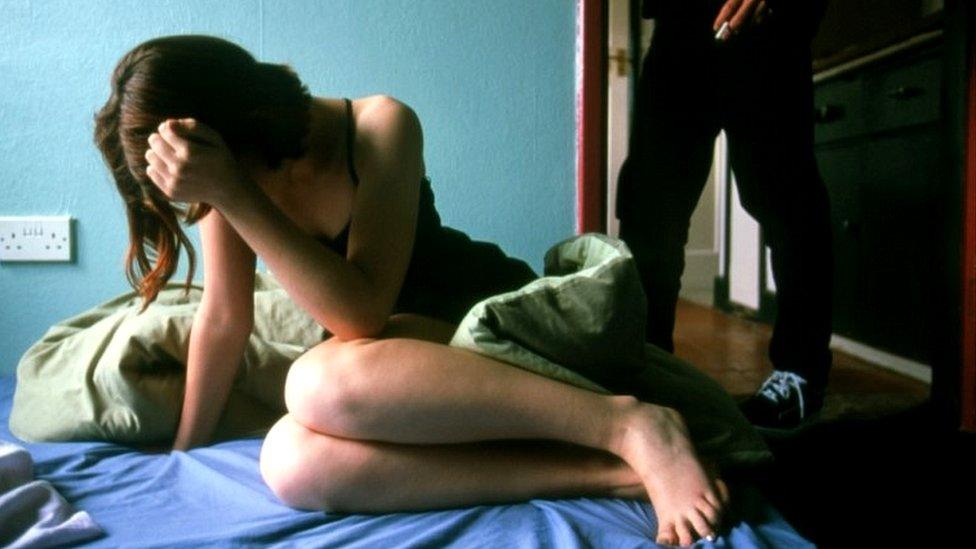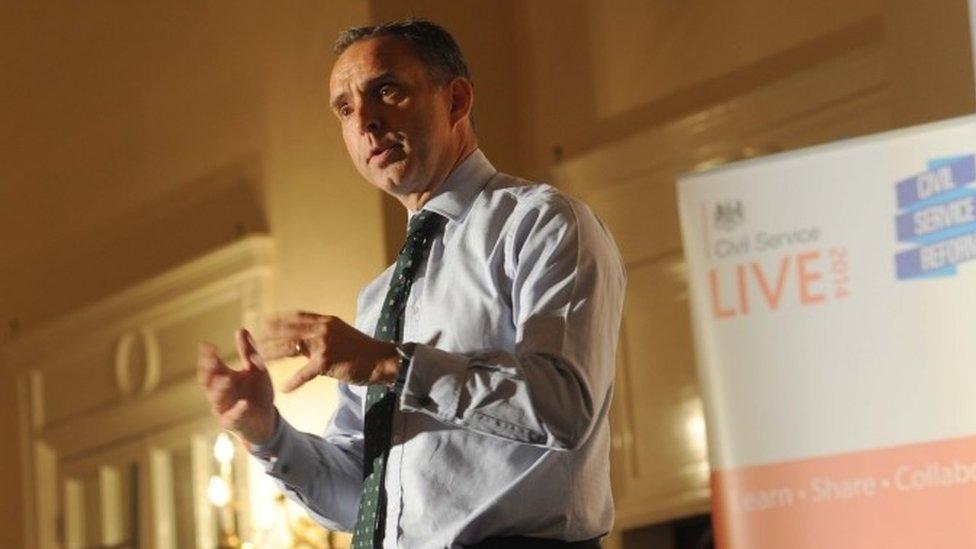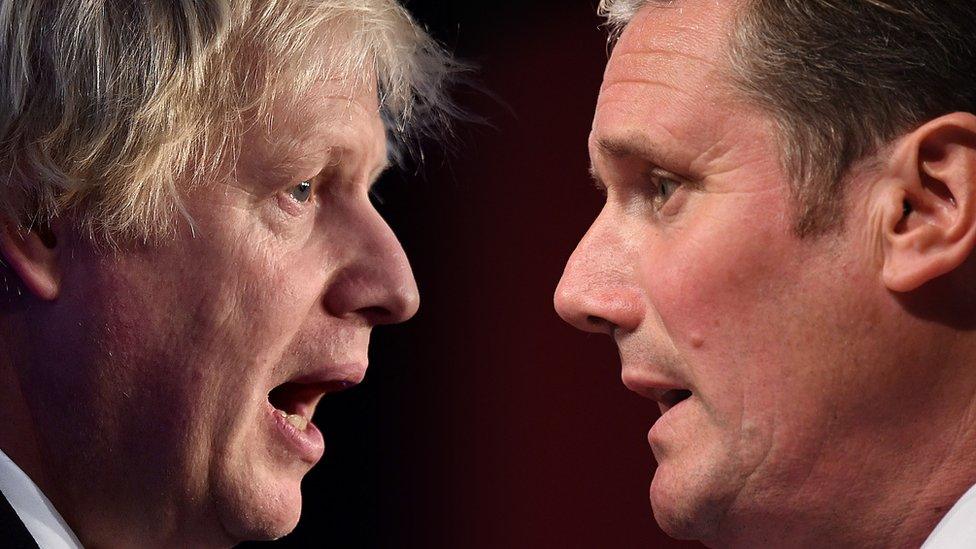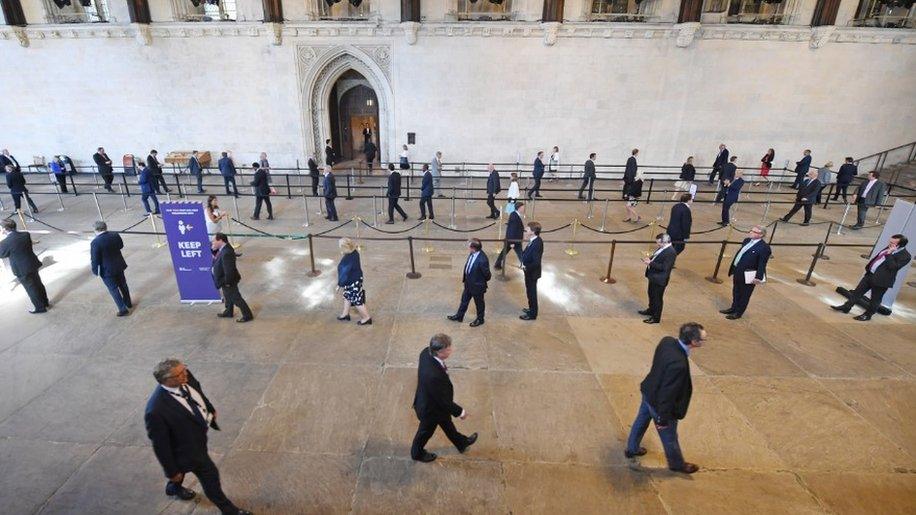The week ahead in Parliament
- Published

MPs will spend most of the coming week talking about money.
The central event will be a financial statement from Chancellor Rishi Sunak, with an economic debate to follow.
And the main Commons debates on Tuesdays and Wednesdays are Estimates Day debates. These will focus on particular aspects of government spending, chosen via the backbench business committee.
These debates are an opportunity to air concerns about spending. An estimate selected for debate can be amended, but only reductions to the estimate can be proposed; it's not open to MPs to propose increasing spending through this mechanism.
Once the estimates have been agreed, they're put into legislative form through a Supply and Appropriation Bill.
And the other major event of the week is the Domestic Abuse Bill, back in the Commons for Report Stage consideration. There are all kinds of very significant amendments being proposed - including a government amendment to remove the "rough sex" defence for murder.
It's a quiet-looking week in the Lords, although there may be signs of trouble ahead for the Business and Planning Bill.
Here's my rundown of the week ahead:
Monday 6 July
The Commons convenes, at 14:30 BST, for Defence Questions, doubtless to be followed by the usual collection of post-weekend statements from ministers and Urgent Questions.
The main legislative action is the Report Stage and Third Reading of the Domestic Abuse Bill.
The government may have agreed to provide an amendment to ban the "rough sex" defence to murder, but there is still plenty of pressure for other changes, notably from a formidable cross-party alliance of backbenchers, headed by Labour's Harriet Harman and the Conservative Mark Garnier.

A host of amendments have been tabled to the Domestic Abuse Bill
Among the changes they propose is a new clause which would require the consent of the Director of Public Prosecutions for a charge of anything less than murder, in any homicide resulting from domestic abuse,
They also propose new clauses to create a new offence of non-fatal strangulation in domestic abuse, and to prevent the victim's previous sexual history being used as evidence to prove consent to violence in a domestic homicide case.
Labour's Yvette Cooper and Conservative Robert Halfon have amendments on the management of serial and serious domestic abuse and stalking perpetrators, and a group of traditionalist Conservatives led by Fiona Bruce wants research on the links between pornography and domestic violence.
Meanwhile, the Green Party MP Caroline Lucas, Labour's Peter Kyle and Plaid's Liz Saville Roberts want lifetime press anonymity for survivors of domestic abuse.
And there is a series of amendments from the Conservative backbencher Philip Davies, including clarifying that economic abuse has to be unreasonable and not to cover incidents of the withholding of money where it is intended to be in a person's best interest - for example, the partner of a gambling addict.
There are plenty more amendments, and the chair's selection for debate is bound to disappoint some MPs.
Some may be fended off by the promise of future government amendments to achieve their aims, by making changes when the bill goes before the Lords.
On the committee corridor, Public Accounts takes evidence at 14.30 BST on the post-Grenfell drive to remove dangerous cladding on tower blocks, from the top civil servant at the Ministry of Housing, Communities and Local Government, Jeremy Pocklington.
And the International Development Committee, also at 14:30 BST, has what seems almost a valedictory session with the Secretary of State Anne-Marie Trevelyan on humanitarian crises monitoring: the impact of coronavirus.
The Joint Committee on Human Rights (16:00) hears from Shadow Justice Secretary David Lammy, HM Inspector of Constabulary Wendy Williams (author of a review into the Home Office handling of the Windrush scandal) and others about black people, racism and human rights.
In the Lords (13:00) questions to ministers cover discussions with the incoming Director General of the BBC on the postponement of the withdrawal of free TV Licenses for people aged over 75; access to medicinal cannabis; increasing consumption of fruit and vegetables by children and adults and the increase in Covid-19 infections as a result of lifting restrictions.
The main legislative action is the second reading of the Business and Planning Bill, the emergency legislation on helping firms adjust to the easing of the lockdown, which was passed by MPs on 29 June.
Detailed committee stage scrutiny will follow on Monday 13 July, and the final consideration a week later.
The Bill was whizzed through the Commons in a single gulp, but its passage through the Lords may be less serene; issues about relaxing the licensing regime to allow off-premises alcohol sales, and pub or restaurant tables on pavements are alarming a number of MPs and there is a strong prospect of a cross-party attempt to rein in what looks to some critics like a troublesome free-for-all.
That could make life interesting, because Downing Street is the driving force behind these measures and might not take kindly to meddling by noble lords, but watch out for a few markers going down in the course of the debate.
Tuesday 7 July
The Commons opens at 11:30 BST with Treasury Questions.
The day's Ten Minute Rule Bill, from former minister Edward Timpson, would raise the retirement age for magistrates from 70 to 75.
Then comes the first set of Estimates Day debates. The first subject is the Department for Education, where the Education Committee Chair, Robert Halfon, will highlight the impact of the lockdown on children, millions of whom have had little contact with teachers.
His fear is that the result could be an "education ice age", doing long-term damage to their learning, and to their wider well-being.
The Treasury Committee Chair, Mel Stride, will lead a debate on the estimates for HM Revenue and Customs, focusing on the Coronavirus Job Retention Scheme and support for the self-employed, and how the system will deal with the effects of local lockdowns
The second debate is on the estimates for the Department of Business, Energy and Industrial Strategy.
Select committee chair Darren Jones' speech will argue that the best way to support workers and businesses in their recovery and growth in the post-lockdown economy, is a targeted industrial strategy combined with investment in skills and training.
He will also say investment in green industry and technology must be central to the future economic strategy.
The day's committee hearings include Public Administration and Constitutional Affairs (09:30). whose members will question ministers Jesse Norman and Lord Agnew plus Nick Smallwood, the chief executive officer of the Infrastructure and Projects Authority, on the government's management of its major projects.
Justice (14:30) looks at the injustices resulting from private prosecutions brought by organisations that act as the investigator and the prosecutor but are also the victim of the alleged offence - this follows the Post Office Horizon scandal.
And Defence (14:30) has a session with General Sir Nick Carter, the Chief of the Defence Staff,
In the Lords (11:00) questions cover the financial threat to local government in England from the pandemic, ensuring no detainee of an immigration removal centre is released without accommodation support and advice and the risks for British travellers to the United States of eating chicken which has been subject to a pathogen reduction treatment and hormone-fed beef.
Then peers turn to the first of four days of Committee Stage scrutiny of the Agriculture Bill. This is the "shadow-boxing" stage, where amendments are debated but almost never pushed to a vote; the idea is to test the detail of the Bill and seek explanations from ministers, usually teeing up better-honed amendments at the later Report Stage, which is not expected until the autumn,
Wednesday 8 July
MPs open, at 11:30 BST, with half an hour of Wales questions, with PMQs to follow, at noon.
The Ten Minute Rule Bill, from former cabinet minister Maria Miller, is on Redundancy Protection during their pregnancy and maternity leave. The Bill gives mothers the same kind of safeguards as women in Germany, protecting them from redundancy when pregnant and in the months following the birth.
With record numbers of women in work, she believes their continued role in the workplace is crucial for the recovery from Covid-19.
Government data shows more than 50,000 women leave their jobs when pregnant because of their experiences at work, one in 20 are made redundant and Maria Miller fears that the pandemic will exacerbate this problem.
The main event is Rishi Sunak's statement, followed by debate on the economy. This is not expected to be a full-scale "fiscal event" complete with economic projections from the Treasury and the Office for Budget Responsibility - more a list of shovel-ready building programmes to be triggered.
A key factor is that no-one really knows whether the easing of the lockdown will trigger a spending boom as pent-up consumers flock to the shops, or whether people will be more cautious, so any decisions on tax cuts to stimulate the economy would be premature.
And the chancellor's words will be studied for hints about how and when he plans to raise taxes to re-balance the post-Covid books. There may also be some targeted measures to help communities like Leicester that might face a second lockdown.

Outgoing national security adviser Sir Mark Sedwill is due to appear before MPs
It's a busy day for the committees. At 15,00 BST, the Joint Committee on the National Security Strategy, a super-committee of senior parliamentarians, chaired by the former Foreign Secretary, Dame Margaret Beckett, hears from Sir Mark Sedwill, the Cabinet Secretary and National Security Adviser.
Sir Mark is due to leave his post in September, to be replaced as NSA by the Brexit negotiator, David Frost. I suspect that changing of the guard may come up.
Elsewhere, Home Affairs (09:30) talks to the Commissioner of the Metropolitan Police Service Dame Cressida Dick, Work and Pensions (09:30) meets the Pensions Ombudsman, Anthony Arter and the Treasury Committee (14:30) considers the economic impact of coronavirus with expert witnesses including the former permanent secretary of the Treasury Lord Macpherson.
The Lords (11.00) opens with questions to ministers on the proposed border operating model for customs arrangements between the UK and the EU, representations from the EU on plans to prevent the importation of Xylella Fastidiosa - a plant disease spread by insects, which can have a devastating effect on agriculture and the environment - and on the publication of a government White Paper on social care.
Then peers will consider statutory instruments. The big one is the Health Protection (Coronavirus, Wearing of Face Coverings on Public Transport) (England) Regulations 2020.
This give powers to transport operators to refuse access to someone not wearing a face covering, or to direct them to leave a service if they do not put on a face covering when asked to.
There will be exemptions for passengers with a "reasonable excuse" for not wearing a mask. The argument is that masks can offer limited protection to others, in environments like public transport, where distancing is difficult to manage.
Peers will also consider the Surrender of Offensive Weapons (Compensation) Regulations 2020 which will compensate the owners of some kinds of rapid firing rifles and bump stocks, which increase the rate of fire of self-loading rifles. These will become illegal under the terms of the 2019 Offensive Weapons Act, and will have to be surrendered by their owners.
Thursday 9 July
The Commons opens, at 9:30 BST, with forty minutes of Digital, Culture, Media and Sport questions followed by questions to the Attorney General, and the weekly Commons Business Statement from the Leader of the House
Then comes the second helping of Estimate Day debates. First MPs will focus on spending on Development Assistance, and how that will work when the Department for International Development is merged into the Foreign Office, in September.
Then they turn to the Ministry of Housing, Communities and Local Government, where the focus will be on how ministers plan to compensate councils which have simultaneously had to raise spending on homelessness, social care and environmental health during the pandemic, while losing much of their commercial income.
The debate was triggered by HCLG Committee chair Clive Betts and Public Accounts chair, Meg Hillier, who say they have had considerable trouble pinning down the government's intentions.
There's a rare non-Covid select committee hearing as the Environmental Audit Committee (09:30) looks at the potential of hydrogen as a green power source.
In the Lords (11:00), questions to ministers range across quarantining internet transfers of cash on the grounds of security, the long-awaited publication of the report of the Intelligence and Security Committee on Russian interference in the UK and the impact of the pandemic on the financial sustainability of churches and places of worship. Then it's back to the detail of the Agriculture Bill, and day two of Committee stage consideration
Friday 10 July
Private members bills were to have returned to the Commons today but have now been postponed until September.
So there will be no Second Reading for the "Green Share" Bill, AKA the Co-operative and Community Benefit Societies (Environmentally Sustainable Investment) Bill from Labour's Anna McMorrin. which aimed to allow co-operatives and community associations to make environmentally sustainable investments.
There were worries a few weeks ago that consideration of private members bills would be postponed to the point where there would not be enough time to get any of them onto the statute book.
But I'm told assurances have been given that an extra sitting Friday will be scheduled for September, so that the magic "eighth Friday", the day on which the bills can return to the Commons for Report Stage consideration, will not be unduly delayed.
That should allow sufficient time for any bills agreed by the Commons to go through the Lords and into law. At the moment the real bottleneck is Committee Stage consideration - because there are only a couple of rooms large enough to allow socially-distanced committees to sit, and they're needed for government bills.
By September, the hope is social distancing will be relaxed to the point where more committees can sit, thus allowing private members bills to go through this part of the process.
The Lords, however, are sitting (11:00) to consider statutory instruments. These include the Port Examination Codes of Practice and National Security Determinations Guidance Regulations 2020; the Terrorism Act 2000 (Video Recording with Sound of Interviews and Associated Code of Practice) (Northern Ireland) Order and the Environmental Protection (Plastic Straws, Cotton Buds and Stirrers) (England) Regulations 2020.
- Published10 June 2020

- Published3 June 2020

- Published3 June 2020
